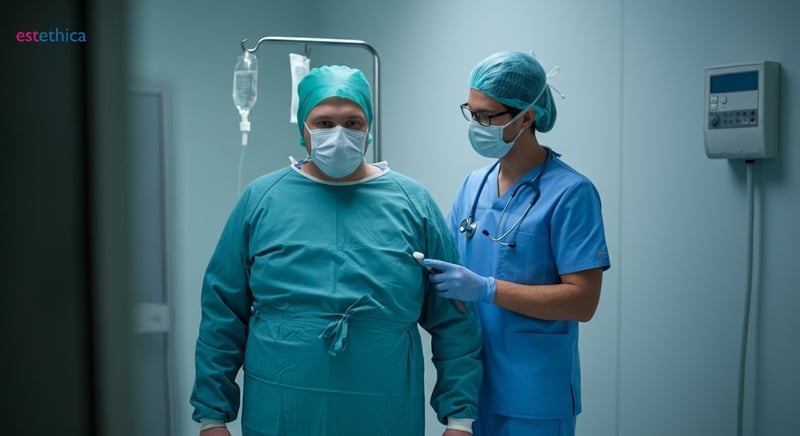Unlocking the Secrets of Stomach Surgery for Lasting Weight Loss
Discover how stomach surgery can be a lasting weight loss solution with the latest procedures and safety protocols.
Stomach surgery, often referred to as bariatric or gastric surgery, has emerged as a significant solution for individuals aiming for lasting weight loss. With the rising global rates of obesity, these surgical procedures are gaining popularity due to their effectiveness. Patients considering such surgeries must understand the various options available, the recovery process, and the associated risks to make informed decisions.
What You Need to Know About Stomach Surgery Options
Understanding Different Types of Stomach Surgery
Stomach surgery, also known as gastric or bariatric surgery, encompasses several procedures aimed at aiding weight loss. Each type of surgery has unique methodologies and is suited for different patient needs. Understanding these options can help in making informed decisions.
Key Types of Stomach Surgery
- Gastric Bypass: This procedure alters the digestive system to limit food intake and nutrient absorption.
- Sleeve Gastrectomy: Involves removing a portion of the stomach to reduce its size and food capacity.
- Adjustable Gastric Banding: A band is placed around the stomach to create a small pouch, restricting food intake.
Each of these surgeries has distinct benefits and potential risks. For instance, gastric bypass often results in significant weight loss but requires lifelong dietary changes.
Steps to Consider Before Choosing a Surgery
- Consultation: Discuss with a healthcare provider to understand the best option based on health status.
- Evaluation: Undergo necessary medical evaluations to assess suitability for surgery.
- Decision: Consider personal weight loss goals and potential lifestyle changes post-surgery.
It's crucial to weigh the pros and cons of each procedure. For example, sleeve gastrectomy is less invasive than gastric bypass but may not be as effective for long-term weight loss.

Understanding the Gastric Surgery Recovery Journey
Essential Dietary Phases Post-Surgery
Post-gastric surgery recovery involves a structured dietary plan to aid healing and adaptation. Initially, patients follow a liquid diet to minimize stress on the stomach. This phase typically lasts one to two weeks, allowing the body to adjust to the changes.
As recovery progresses, patients transition to soft foods. This stage introduces easily digestible foods, such as pureed vegetables and soft proteins, to gradually reintroduce solid textures. This phase is crucial for ensuring the stomach adapts without complications.
Key Nutritional Considerations
- Protein Intake: Essential for healing and maintaining muscle mass.
- Hydration: Vital to prevent dehydration, especially during the liquid phase.
- Vitamin Supplements: Necessary to compensate for reduced nutrient absorption.
Understanding these nutritional needs helps patients maintain health and support recovery. For instance, adequate protein intake is crucial for tissue repair and muscle maintenance.
Steps to Gradually Increase Physical Activity
- Initial Rest: Focus on rest and gentle movements to promote healing.
- Light Exercise: Introduce walking and stretching to enhance circulation.
- Regular Activity: Gradually incorporate more structured exercises as recovery progresses.
These steps ensure a safe return to physical activity, reducing the risk of complications. For example, starting with light walking helps improve circulation without straining the body.

Exploring the Safety of Bariatric Surgery Procedures
Understanding the Risks and Mitigation Strategies
Bariatric surgery, including gastric and stomach surgery, is generally safe when performed by experienced surgeons. However, patients should be aware of potential risks such as infections, nutritional deficiencies, and changes in digestion. These risks can be mitigated through comprehensive pre-surgery counseling and regular post-surgery check-ups.
For example, infections can be minimized by following strict hygiene protocols and monitoring for early signs of complications. Nutritional deficiencies, a common concern, can be addressed by adhering to a tailored dietary plan and taking prescribed supplements. Additionally, understanding the changes in digestion can help patients adjust their eating habits to maintain health and well-being.
Common Risks Associated with Bariatric Surgery
- Infections: Can occur at the incision site or internally, requiring prompt medical attention.
- Nutritional Deficiencies: Result from reduced nutrient absorption, necessitating dietary adjustments.
- Digestive Changes: May include altered bowel habits and food intolerances.
By understanding these risks, patients can take proactive steps to ensure a smoother recovery. For instance, regular follow-ups with healthcare providers can help detect and address any issues early, enhancing the overall safety of the procedure.
Steps to Enhance Safety in Bariatric Surgery
- Pre-Surgery Counseling: Discuss potential risks and lifestyle changes with a healthcare provider.
- Post-Surgery Monitoring: Regular check-ups to track recovery progress and address complications.
- Adherence to Dietary Guidelines: Follow a nutrition plan to prevent deficiencies and support healing.
These steps are crucial for enhancing the safety and effectiveness of bariatric surgery. For example, adhering to dietary guidelines helps prevent nutritional deficiencies, ensuring patients maintain their health post-surgery.

Latest Innovations Transforming Gastric Surgery Today
Advancements in Minimally Invasive Techniques
Recent innovations in gastric surgery, such as laparoscopic techniques, have significantly improved the safety and efficiency of these procedures. Laparoscopy involves small incisions and the use of a camera, allowing surgeons to perform complex operations with minimal trauma to the body. This approach reduces recovery time and lowers the risk of complications, making it a preferred choice for many patients.
For instance, a study showed that patients undergoing laparoscopic gastric bypass experienced a 30% faster recovery compared to traditional open surgery. This advancement not only enhances patient comfort but also decreases hospital stay durations, leading to better overall outcomes.
Key Benefits of Minimally Invasive Gastric Surgery
- Reduced Recovery Time: Patients typically return to normal activities more quickly.
- Lower Risk of Infection: Smaller incisions decrease the likelihood of post-surgical infections.
- Improved Surgical Precision: Enhanced visualization allows for more accurate procedures.
These benefits make minimally invasive techniques an attractive option for those considering gastric surgery for weight loss. For example, sleeve gastrectomy performed laparoscopically has shown promising results in terms of weight loss and patient satisfaction.
Steps in Implementing New Surgical Innovations
- Research and Development: Continuous innovation in surgical tools and techniques.
- Training and Certification: Surgeons undergo specialized training to master new methods.
- Patient Education: Informing patients about the benefits and expectations of advanced procedures.
These steps ensure that the latest innovations in gastric surgery are effectively integrated into clinical practice, offering patients safer and more effective treatment options. For instance, ongoing research into robotic-assisted surgeries promises even greater precision and outcomes in the future.
Innovative Minimally Invasive Gastric Surgery Techniques
Structured Recovery Plans for Optimal Post-Surgery Outcomes
Frequently Asked Questions
What are the different types of stomach surgery for weight loss?
What is the recovery time for gastric surgery?
How safe is bariatric surgery?
What are the latest innovations in gastric surgery?
What steps should be taken before choosing a stomach surgery option?
Discover the art of healthy beauty with estethica's award-winning services. Call now for your free consultation and take the first step towards a more confident you!
📞 Call for Your Free Consultation